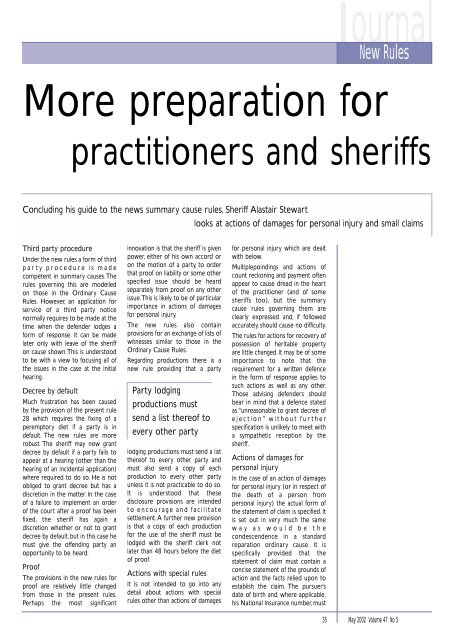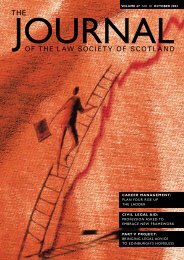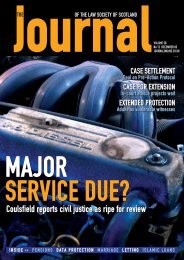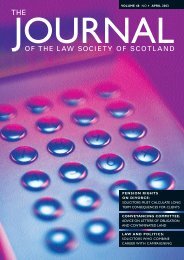OF THE LAW SOCIETY OF SCOTLAND - The Journal Online
OF THE LAW SOCIETY OF SCOTLAND - The Journal Online
OF THE LAW SOCIETY OF SCOTLAND - The Journal Online
You also want an ePaper? Increase the reach of your titles
YUMPU automatically turns print PDFs into web optimized ePapers that Google loves.
<strong>Journal</strong><br />
New Rules<br />
More preparation for<br />
Third party procedure<br />
Under the new rules a form of third<br />
party procedure is made<br />
competent in summary causes. <strong>The</strong><br />
rules governing this are modelled<br />
on those in the Ordinary Cause<br />
Rules. However, an application for<br />
service of a third party notice<br />
normally requires to be made at the<br />
time when the defender lodges a<br />
form of response. It can be made<br />
later only with leave of the sheriff<br />
on cause shown.This is understood<br />
to be with a view to focusing all of<br />
the issues in the case at the initial<br />
hearing.<br />
Decree by default<br />
Much frustration has been caused<br />
by the provision of the present rule<br />
28 which requires the fixing of a<br />
peremptory diet if a party is in<br />
default. <strong>The</strong> new rules are more<br />
robust. <strong>The</strong> sheriff may now grant<br />
decree by default if a party fails to<br />
appear at a hearing (other than the<br />
hearing of an incidental application)<br />
where required to do so. He is not<br />
obliged to grant decree but has a<br />
discretion in the matter. In the case<br />
of a failure to implement an order<br />
of the court after a proof has been<br />
fixed, the sheriff has again a<br />
discretion whether or not to grant<br />
decree by default, but in this case he<br />
must give the offending party an<br />
opportunity to be heard.<br />
Proof<br />
<strong>The</strong> provisions in the new rules for<br />
proof are relatively little changed<br />
from those in the present rules.<br />
Perhaps the most significant<br />
practitioners and sheriffs<br />
Concluding his guide to the news summary cause rules, Sheriff Alastair Stewart<br />
looks at actions of damages for personal injury and small claims<br />
innovation is that the sheriff is given<br />
power, either of his own accord or<br />
on the motion of a party, to order<br />
that proof on liability or some other<br />
specified issue should be heard<br />
separately from proof on any other<br />
issue.This is likely to be of particular<br />
importance in actions of damages<br />
for personal injury.<br />
<strong>The</strong> new rules also contain<br />
provisions for an exchange of lists of<br />
witnesses similar to those in the<br />
Ordinary Cause Rules.<br />
Regarding productions there is a<br />
new rule providing that a party<br />
Party lodging<br />
productions must<br />
send a list thereof to<br />
every other party<br />
lodging productions must send a list<br />
thereof to every other party and<br />
must also send a copy of each<br />
production to every other party<br />
unless it is not practicable to do so.<br />
It is understood that these<br />
disclosure provisions are intended<br />
to encourage and facilitate<br />
settlement. A further new provision<br />
is that a copy of each production<br />
for the use of the sheriff must be<br />
lodged with the sheriff clerk not<br />
later than 48 hours before the diet<br />
of proof.<br />
Actions with special rules<br />
It is not intended to go into any<br />
detail about actions with special<br />
rules other than actions of damages<br />
for personal injury which are dealt<br />
with below.<br />
Multiplepoindings and actions of<br />
count reckoning and payment often<br />
appear to cause dread in the heart<br />
of the practitioner (and of some<br />
sheriffs too), but the summary<br />
cause rules governing them are<br />
clearly expressed and, if followed<br />
accurately, should cause no difficulty.<br />
<strong>The</strong> rules for actions for recovery of<br />
possession of heritable property<br />
are little changed. It may be of some<br />
importance to note that the<br />
requirement for a written defence<br />
in the form of response applies to<br />
such actions as well as any other.<br />
Those advising defenders should<br />
bear in mind that a defence stated<br />
as “unreasonable to grant decree of<br />
ejection” without further<br />
specification is unlikely to meet with<br />
a sympathetic reception by the<br />
sheriff.<br />
Actions of damages for<br />
personal injury<br />
In the case of an action of damages<br />
for personal injury (or in respect of<br />
the death of a person from<br />
personal injury) the actual form of<br />
the statement of claim is specified. It<br />
is set out in very much the same<br />
way as would be the<br />
condescendence in a standard<br />
reparation ordinary cause. It is<br />
specifically provided that the<br />
statement of claim must contain a<br />
concise statement of the grounds of<br />
action and the facts relied upon to<br />
establish the claim. <strong>The</strong> pursuer’s<br />
date of birth and, where applicable,<br />
his National Insurance number, must<br />
35 May 2002 Volume 47 No 5










